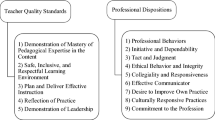Abstract
Fifty-five Head Start teachers and aides enrolled in Child Development Associate (CDA) training were pre- and posttested on a variety of measures to assess the effects of training. Additionally, their teaching beliefs, dogmatism, and self-concept scores were compared to those of undergraduate student teachers within a traditional teacher training program. The results indicated positive changes in self-assessed job performance, self-confidence, and educational aspirations and an increase in cognitively oriented, child-centered beliefs. The CDA trainees were not found to differ from the undergraduates completing four-year teacher training programs.
Similar content being viewed by others
References
Berk, L. & Berson, M. (1981). A review of the Child Development Associate credential.Child Care Quarterly, 10(1), 9–42.
Brawley, E., Gerstein, H., & Watkins, K. A. (1981). A competency-based training program for daycare personnel.Child Care Quarterly, 10(2), 125–136.
Fitts, W. (1964).Tennessee Self Concept Scale. Nashville: Counselor Recordings and Tests.
Jones, L. & Hamby, T. M. (1981). Comments on “A review of the Child Development Associate credential.”Child Care Quarterly, 10(1), 74–83.
Jones, L., Hamby, T. M., & Hardy, S. B. (1978).CDA pilot projects: Innovations in training. Washington, DC: University Research Corporation.
Peters, D. L., & Kostelnik, M. (1981). Current research in day care personnel preparation. In S. Kilmer (Ed.),Advances in early education and day care (Vol. 2). Greenwich, CT: JAI Press.
Pettygrove, W. (1981). The Child Development Associate credential as a child care staff standard: Accuracy, career development, and policy implications.Child Care Quarterly, 10(1), 43–58.
Rokeach, M. (1960).The open and closed mind. New York: Basic Books.
Rotter, J. B. (1966). Generalized expectancies for internal versus external control of reinforcement.Psychological Monographs, 80(1, Whole No. 609).
Ruopp, R., Travers, J., Glantz, F., & Coelen, C. (1979).Children at the center (Vol. 1, Final Report of the National Day Care Study). Cambridge, MA: ABT Associates.
Trickett, P. (1979). Career development in Head Start. In E. Zigler & J. Valentine (Eds.),Project Head Start, New York: Free Press.
Verma, S. & Peters, D. L. (1975). Day care teacher practices and beliefs.Alberta Journal of Educational Research, 21, 46–55.
Author information
Authors and Affiliations
Rights and permissions
About this article
Cite this article
Peters, D.L., Sutton, R.E. The effects of CDA training on the beliefs, attitudes, and behaviors of head start personnel. Child Youth Care Forum 13, 251–261 (1984). https://doi.org/10.1007/BF01118802
Issue Date:
DOI: https://doi.org/10.1007/BF01118802




